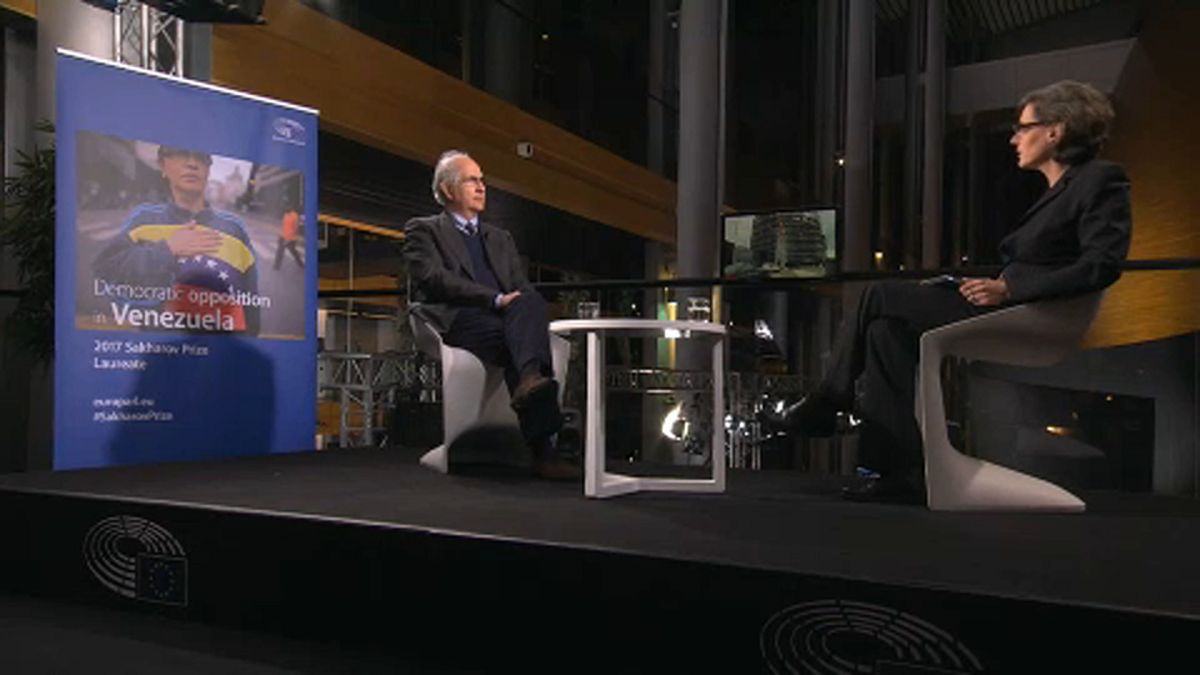Opposition leader speaks to Euronews on award of EU Sakharov Prize
Venezuela’s held three elections in just five months, which have left President Nicolas Maduro with almost absolute power.
Predictable maybe, with the opposition boycotting the polls, after reporting all sorts of irregularities.
Among those who refused to take part was Antonio Ledezma, former Mayor of Caracas and an opposition leader.
After spending 1000 days in detention, in prison and under house arrest, he escaped from Venezuela last month. First by car to Colombia, and then he took a flight to Madrid.
Ledezma has travelled to Strasbourg to receive the EU’s Sakharov Prize for Freedom of Thought, where he spoke to Euronews.
Ana Lazaro Bosch, Euronews: “You arrived in Strasbourg after having escaped from Venezuela, something you describe as being like a ‘film.’ I guess it was not easy for you to leave. What was the most difficult moment for you, of the decision to leave your country?”
Antonio Ledezma: “When I closed the door of my apartment, in my mind it was like closing the door on the border of my country. When I said goodbye to my house, my room, the photographs of my family, my wife, my children.. when I caressed my books.. With this farewell, I was saying goodbye to Venezuela … I left there, but I have it here in my heart. It was the most difficult moment.”
Euronews: “At the beginning of the year we saw dramatic demonstrations, there were people dead in the streets. What is the Venezuela like that you left?”
Antonio Ledezma: “A Venezuela that is surviving drug-tyranny. With people who do not want to give up, who refuse to resign, to live without being able to enjoy the right to express themselves, to think freely, to enjoy the human rights of which Sakharov spoke – and which are inalienable.”
Euronews: “You were not in favour of participating in the dialogue proposed by the government of President Maduro, neither did you want to take part in the municipal elections… What are the ways to get out of this crisis if you can’t vote, if you can’t debate?”
Antonio Ledezma: “Resist and fight. Neither the people of Venezuela, neither us, are opposed to dialogue. What we are questioning is false dialogue. A dialogue that began last year and you can see that after that dialogue started, what we see is more political prisoners, what we see is more political persecution and there is more obstruction of the electoral process. We proposed a referendum and that right to popular consultation was stolen from us.”
Euronews: “What do you think of what President Maduro has said about those who didn’t participate in the local elections, not having the right to participate in the presidential 2018 vote?”
Antonio Ledezma: “You can only hear something like that from someone who doesn’t have a democratic spirit, who does not respect the laws, who does not respect dissent. And those kinds of threats are typical of dictators.”
Euronews: “I would like us to talk about the population of Venezuela. Because the feeling we see in Europe is that it is very divided. In the last elections, Maduro achieved good results. It is true that it was completely predictable since the opposition didn’t take part. But, he still has a significant number of voters and surely it is among the most humble layers of the population.
“Do you think that the neo-liberal policies of the eighties have a responsibility in what is happening now?”
Antonio Ledezma: “I’m not refusing to analyse what has happened in Venezuela during the last fifty years. What I want to say is that both Chavez and Maduro have been running the country for 20 years, they received the opportunity to manage a colossal budget nourished by petrodollars and today what we have is an indebted country, a country that’s not been able to multiply oil revenues and to transform them in education, in health, in better opportunities for Venezuelans. They have indebted Venezuela and plunged the majority of Venezuelans into poverty.”
Euronews: “What do you propose then to reconcile the Venezuelan population?”
Antonio Ledezma: “First, get rid of this ‘drug-tyranny,’ because in Venezuela we suffer the rigors. And then, start a truly transparent process of elections that will allow people to get a legitimate government. And with that legitimate government, to start a process of reunification of Venezuelan society and an economic and social relaunch of the country because Venezuela has an incredible potential that allows me to look towards the future with optimism.”
Euronews: “I would like to change subject, and ask you about Spain and the Catalan crisis. President Maduro has said that in Spain there are political prisoners and that the Spanish government should initiate a political dialogue. I would like to know what you think about these statements and if you think that in Spain there are political prisoners.”
Antonio Ledezma: “Any person who is judged because of their ideas, can be considered a political prisoner, but in this case we are talking not just about someone who defends their ideas, we are talking about someone who nothing more and nothing less has raised a breach of the territorial unity of Spain.”


